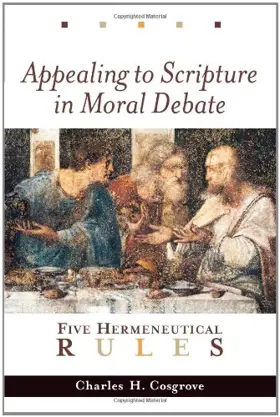

Appealing to Scripture in Moral Debate: Five Hermeneutical Rules
Pages
232
Publisher
Eerdmans
Published
2002
ISBN-13
9780802849427
Arguing from scripture is one of the ways that Christians test theirmoral judgments. But are all methods of appealing to the Bibleequally valid and effective? In this book Charles Cosgrove looksat the churchs long tradition of moral debate and uncovers fivecentral rules that can best guide the use of scripture in con-temporaryethical debates.After introducing the nature of moral arguments generally, Cosgrove devotes one chapter to each of the five rules of biblicalinterpretation that make ethical appeals to scripture persuasive. Hesets forth each rules rationale, provides examples of its operation, and subjects it to critique.Based not only on the work of biblical scholars and Christianethicists but also on Cosgroves own experience with debates inclassrooms, churches, and other Christian contexts, this volume isbe a valuable aid to readers who employ moral reasoning inreal-life settings.
Reviews
Charles H. Cosgrove’s Appealing to Scripture in Moral Debate: Five HermeneuticalRules is a successful attempt to demonstrate that contemporary-era Christianinterpretative schemata do not preclude a “valid use of scripture in moral argument.” Thiswork is neither an exhaustive study of either contemporary hermeneutics or moral theorynor a setting forth of a case for any particular ethical theory. For Cosgrove and mostcontemporary moral theorists, the use of Scripture in moral debate is not “prescriptive” orrule based; rather, “scripture speaks to the moral life at the level of basic values andprinciples, not at the level of moral rules” (5). The rules that Cosgrove defines in thiswork are not moral rules but rules that “state certain norms for the valid use of scripturein moral argument” (3) in the contemporary era.Cosgrove’s hermeneutical rules assume a lowest common denominator or “bareminimum” theory of scriptural authority in which the weight given to Scripture in moraldebate is whatever weight the interpreter chooses to ascribe to it, with the one restrictionthat Scripture does carry some weight. For Cosgrove, the authority of Scripture is notabsolutistic (Scripture is the absolute authority with no exceptions) or presumptive(Scriptural authority is presumed but may be abandoned in particular cases) butrelativistic (scriptural authority is given whatever weight one wishes to ascribe to it).
[Full Review]
